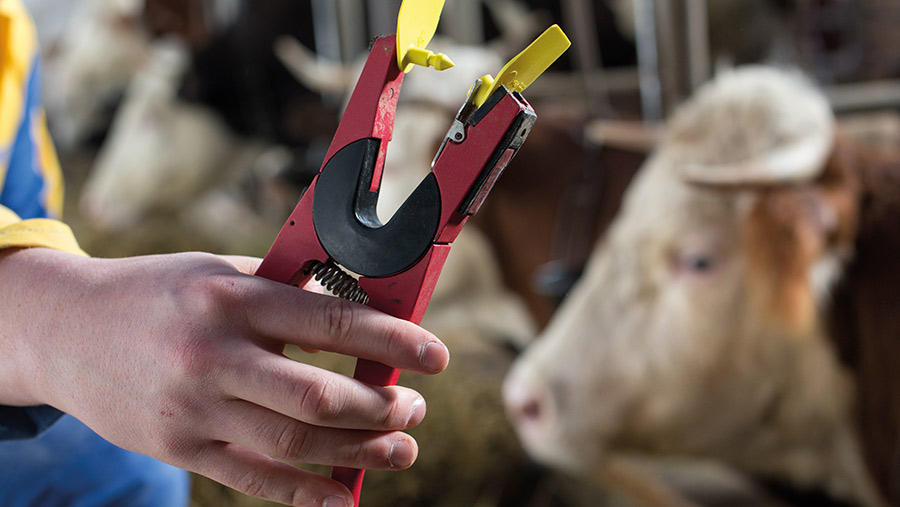Fraudulent breeders threaten trust in entire cattle industry
 © Budimir Jevtic
© Budimir Jevtic Cattle paperwork errors, whether pre-meditated or unwitting, risk undermining food safety and threaten consumer trust in beef and dairy, says Defra.
It has reminded farmers that animal identification and traceability underpins food safety.
The warning follows the Ballinloan Jaegerbomb scandal, and the Trading Standards review of the Bells of Hilltop Farm Cumbria, which resulted in a £20,000 fine.
See also: Lim-gate: What next for EBVs?
“If it is perceived that measures to correctly identify animals are poor, consumer confidence in the safety of beef, and possibly dairy produce, could be lost,” Defra told Farmers Weekly.
Defra listed the following records as impinging on food safety regulations:
- Date of birth: The range of specified risk material that must be removed from cattle after slaughter varies depending upon the age of the animal, and the requirement to take a brain stem sample to test for transmissible spongiform encephalopathies (TSE) in “at risk” cattle applies to all animals over 48 months of age. Age is determined from the records on the Cattle Tracing System (CTS) and its passport.
- Sire and dam: TSE susceptibility is passed down through the dam (not the sire), so if a keeper does not provide the correct dam ID information when applying to British Cattle Movement Service for a passport, TSE traceability can be compromised.
- Incorrect movements: If keepers do not report to the CTS the movement of cattle on and off their holdings (or report them late), the ability to trace and apply measures to reduce disease spread may be compromised in the event of a disease outbreak.
- Zootechnical certification on semen: Zootech legislation facilitates the trade of pedigree animals and germinal products (including semen and embryos) on equivalent terms. It applies to bovine, equine, porcine, caprine and ovine species. Animals imported or produced from imported germinal products should not be entered into the main section of a herd book without an accompanying valid zootechnical certificate for either the animal or the germinal products which produced it.
Minority of rule breakers
John Royle, NFU chief livestock adviser, leapt to the defence of the industry, stating those purposefully breaking the rules are “most definitely in the minority” of farmers and breeders.
He added that many pedigree societies were now adopting DNA testing to confirm parentage, with most (about 96%) of all births recorded online through farm software or direct on CTS online.
“It is for the breed societies to police their own herd books, hence the DNA and genomic testing becoming the norm,” said Mr Royle.
The Aberdeen Angus Cattle Society is among a growing number of societies to make DNA verification mandatory. The rule for first-calved females came into force in June 2020 and bulls have needed DNA verification since 2017.
Robert Gilchrist, the society’s chief executive, said: “It costs a lot of money to undertake but it’s worthwhile, and it keeps us ahead of the curve compared with some other breeds.”
Faith in EBV
Aside from consumer confidence in food safety, many in the industry fear fictitious dates of birth and the “tag late and feed early” approach is undermining industry confidence in estimated breeding values (EBVs).
Mr Gilchrist reassured breeders that the EBV system catches people out in the long run, adding:
“We rely on the Breedplan performance-recording system to alert us to anomalies in data, such as weight gain, dates of birth, calving ease and calving intervals.”
He underlined the role the EBV system had in policing performance data in a non-biased, computer-generated way that was less time consuming than herd inspections.
National Beef Association chief executive Neil Shand said breed society inspections he had been involved with had found very few errors, adding genuine mistakes on gender or sire could be made.
Mr Shand said: “Pedigree breeding is seen as the Rolls Royce of the industry – we look up to breeders and trust and rely on them to lead from the front.
“We are fortunate in the UK that breed societies operate under autonomy, unlike much of Europe, where they are linked with government organisations.”
He added that global beef demand was massive and stressed the hard work that has gone into maintaining the high reputation UK beef traceability, health, and welfare.
“We need to ensure we maintain these standards and possibly improve further in the future.”
